Filter by
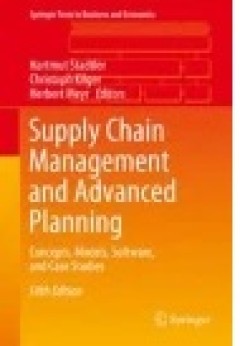
Supply Chain Management and Advanced Planning
Supply Chain Management, Enterprise Resources Planning (ERP), and Advanced Planning Systems (APS) are important concepts in order to organize and optimize the flow of materials, information and financial funds. This book, already in its fifth edition, gives a broad and up-to-date overview of the concepts underlying APS. Special emphasis is given to modeling supply chains and implementing APS su…
- Edition
- -
- ISBN/ISSN
- 978-3-642-55309-7
- Collation
- XXX, 557
- Series Title
- Springer Texts in Business and Economics
- Call Number
- -

Interpreting Canada’s 2019 Food Guide and Food Labelling for Health Profess…
This textbook provides the novice learner with a foundational understanding of Canada’s 2019 Food Guide and Food Labelling. It highlights important considerations for future health professionals seeking to adopt the new food guide into their practice, including strategies towards healthy eating. This open textbook underscores a relational inquiry approach to inform discussions with clients ab…
- Edition
- -
- ISBN/ISSN
- -
- Collation
- -
- Series Title
- -
- Call Number
- 650

Supply Chain Design and Management for Emerging Markets
This book focuses on supply chain management in emerging markets. The authors present issues relating to supply chain development covering countries such as Brazil, China, the Czech Republic, Russia, Indonesia, Malaysia, Nepal, Turkey, Egypt and South Africa and focuses on the challenges faced when the supply chain is designed and maintained. Such challenges derive from issues to do with risk, …
- Edition
- -
- ISBN/ISSN
- 978-3-319-05765-1
- Collation
- XIV, 357
- Series Title
- -
- Call Number
- -

Tourism and Travel during the Cold War : Negotiating Tourist Experiences acro…
The Iron Curtain was not an impenetrable divide, and contacts between East and West took place regularly and on various levels throughout the Cold War. This book explores how the European tourist industry transcended the ideological fault lines and the communist states attracted an ever-increasing number of Western tourists. Based on extensive original research, it examines the ramifications of…
- Edition
- -
- ISBN/ISSN
- 9780429577116
- Collation
- -
- Series Title
- -
- Call Number
- 650
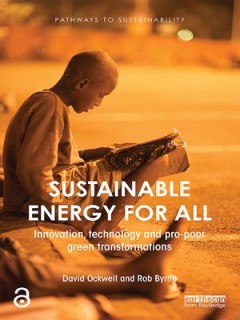
Sustainable Energy for All Innovation, technology and pro-poor green transfor…
Despite decades of effort and billions of dollars spent, two thirds of people in sub-Saharan Africa still lack access to electricity, a vital pre-cursor to economic development and poverty reduction. Ambitious international policy commitments seek to address this, but scholarship has failed to keep pace with policy ambitions, lacking both the empirical basis and the theoretical perspective to i…
- Edition
- -
- ISBN/ISSN
- -
- Collation
- -
- Series Title
- -
- Call Number
- 650
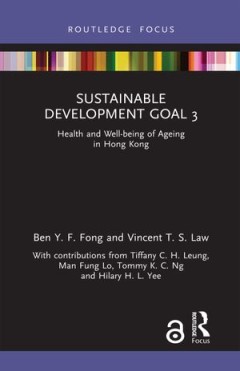
Sustainable Development Goal 3 : Health and Well-being of Ageing in Hong Kong
Sustainable Development Goals (SDGs) aim to develop a better and sustainable future for the world and the goals are part of an action plan to address poverty, hunger, health, gender equity and various pressing world issues. One of these goals looks at health and wellness. Ageing populations have become a crucial issue worldwide and this short monograph explores ageing and how the consequences o…
- Edition
- -
- ISBN/ISSN
- 9781000544282,
- Collation
- -
- Series Title
- -
- Call Number
- 650
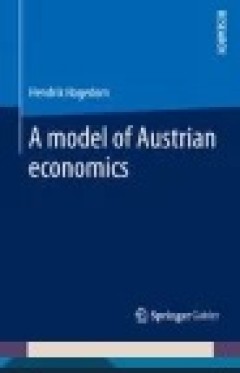
A model of Austrian economics
After the most recent financial crisis it has become clear that there exists a crisis also in economics as a science. The prevailing paradigms have failed to anticipate and to understand the financial crisis. New approaches are therefore needed. Of particular interest should be approaches that combine insights from those parts of economics that are largely neglected by the mainstream. Hendrik H…
- Edition
- Ed. 1
- ISBN/ISSN
- 978-3-658-07077-9
- Collation
- VIII, 104
- Series Title
- -
- Call Number
- 330 HAG m
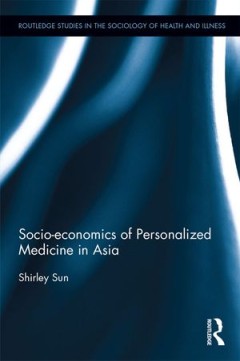
Socio-economics of Personalized Medicine in Asia
The second decade of the twenty-first century has witnessed a surging interest in personalized medicine with the concomitant promise to enable more precise diagnosis and treatment of disease and illness, based upon an individual’s unique genetic makeup.In this book, my goal is to contribute to a growing body of literature on personalized medicine by tracing and analyzing how this field has bl…
- Edition
- -
- ISBN/ISSN
- 9781134989126
- Collation
- -
- Series Title
- -
- Call Number
- 650
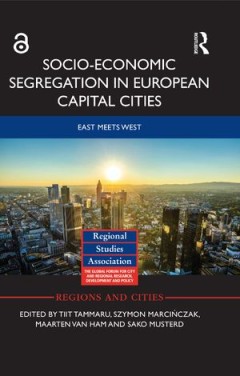
Socio-Economic Segregation in European Capital Cities
Growing inequalities in Europe are a major challenge threatening the sustainability of urban communities and the competiveness of European cities. While the levels of socio-economic segregation in European cities are still modest compared to some parts of the world, the poor are increasingly concentrating spatially within capital cities across Europe. An overlooked area of research, this book o…
- Edition
- -
- ISBN/ISSN
- -
- Collation
- -
- Series Title
- -
- Call Number
- 650

A Wealth of Buildings: Marking the Rhythm of English History: Volume II: 1688…
This two-volume book explores how the great buildings of England bear witness to a thousand years of the nation’s history. In every age, investment in iconic buildings reaches a climax when the prevailing mode of production is operating most effectively, surplus wealth is most plentiful, and the dominant class rules supreme. During such periods of stability and prosperity, the demand for new …
- Edition
- Ed. 1
- ISBN/ISSN
- 978-1-349-94980-9
- Collation
- XXVI, 431
- Series Title
- -
- Call Number
- 330 BAR w
 Computer Science, Information & General Works
Computer Science, Information & General Works  Philosophy & Psychology
Philosophy & Psychology  Religion
Religion  Social Sciences
Social Sciences  Language
Language  Pure Science
Pure Science  Applied Sciences
Applied Sciences  Art & Recreation
Art & Recreation  Literature
Literature  History & Geography
History & Geography